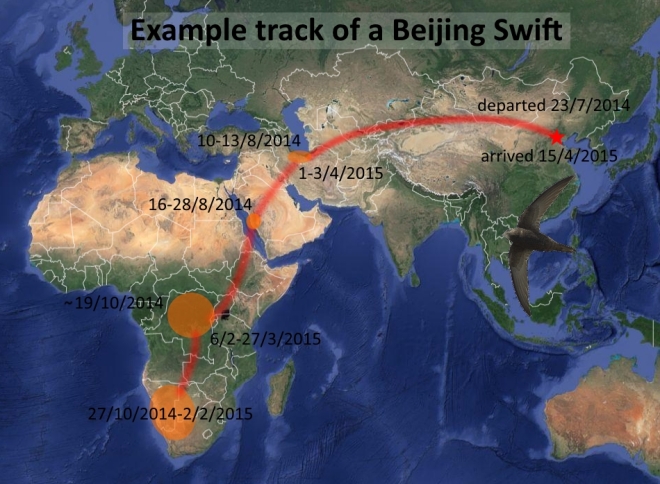2017: A Turning Point For China’s Biodiversity?
Terry Townshend, Birding Beijing, January 3rd 2018
This article has been reproduced here in full, with the author’s permission, to help reassure everyone who cares for conservation that progress really can be made…
2017 has been quite a year. Politically, one can feel the tectonic plates shifting with the turmoil in the West contrasting with the increasing power, and confidence, of a resurgent China. It’s a fascinating time to live in the capital city of the world’s largest economy in waiting.
But hang on, why do I begin the Birding Beijing review of 2017 by writing about politics? The reason is that, if you care about birds or conservation, politics matters. And, with Xi Jinping beginning his second five-year term as President, the direction in which he is taking China is becoming clearer and that has implications for birds and wildlife. In October 2017, at the 19th Communist Party Congress, President Xi delivered the ‘manifesto’ for his second term, a three-and-a-half-hour speech, catchily entitled “Secure a Decisive Victory in Building a Moderately Prosperous Society in All Respects and Strive for the Great Success of Socialism with Chinese Characteristics for a New Era.” The speech touched on everything from reform of State-owned Enterprises to the Digital Economy. And at every meeting I have attended with government since, officials have quoted from the speech. Given the top-down nature of China’s government, what Xi says is that important.
From my conversations with Chinese friends in government and outside, I am convinced that President Xi is personally committed to protecting China’s environment and there are sections of his speech from which conservationists should take heart. For example:
“We must pursue a model of sustainable development featuring increased
production, higher living standards, and healthy ecosystems. We must continue
the Beautiful China initiative to create good working and living environments for
our people and play our part in ensuring global ecological security.”
“We will establish an environmental governance system in which government takes the lead, enterprises assume main responsibility, and social organizations and the public participate.”
“We will take tough steps to stop and punish all activities that damage the environment.”
Xi has also committed to create a system of National Parks and launched the overarching policy in September 2017. According to the associated press release, China “has set up ten pilot programs for the national park system, covering areas including Sanjiangyuan (the source of China’s three major rivers), Giant Panda habitats and the Great Wall” and “ordered all its provinces and regions to establish an ecological “red line” that will declare designated regions under mandatory and rigorous protection.”
These are positive steps and the relevant government departments and local officials will be using these statements and policies as their guiding light for the next five years.
And in case you might think that words are hollow, there has been some tangible progress this year that will give conservationists cause for optimism.
For example, in April the Chinese government announced that 14 sites along the Yellow Sea coast and Bohai Bay – critical to millions of migratory shorebirds, including the Critically Endangered Spoon-billed Sandpiper – had been added to the “tentative list” for UNESCO World Heritage Site nomination. Although the tentative nomination, in itself, does nothing to protect these sites on the ground, it signals intent from the government. And, should these sites make it onto the formal World Heritage Site list, that listing comes with a hard commitment to protect and effectively manage them.

At a more micro level, under the terms of the revised Environment Protection Law, ‘public interest’ lawsuits have been pursued against local governments that violate environmental regulations. For example, the government in Henan Province was fined around USD 555,000 for destroying Jujube trees, some of which were up to 500 years old, as part of a land reclamation project. At the end of its verdict announcement, the court said it would continue to improve its handling of environmental cases, in accordance with the “lucid waters and lush mountains are invaluable assets” policy laid out by President Xi Jinping during the Party’s 19th National Congress in October, illustrating the power of President Xi’s speech.
And, of course, to improve its domestic environment, the battle against air pollution is well underway and, with an uncertain impact globally, China has banned the import of plastic waste.
At the same time, 2017 has seen significant growth in philanthropy from China’s wealthy elite and public charitable giving. And, as Chinese companies seek lucrative public listings on stock exchanges and a greater role overseas, there is a growing emphasis on their image and, with that, comes greater investment in Corporate and Social Responsibility through the creation of charitable foundations or individual projects. A reasonable chunk of that spending is going into, primarily domestic-focused, conservation.
All of this should improve the prospects for China’s biodiversity.
So what of the birds in 2017? Well, it’s heartening to be able to report some good news here too.
First, after great work by Han Zheng and his team from Northeast Normal University in Changchun in discovering some previously unknown breeding sites, the estimated population of the “Endangered” JANKOWSKI’S BUNTING (Emberiza jankowski) could be as high as 9,800-12,500, a massive increase on the previous estimate of fewer than 1,000 individuals. The new sites enjoy no official protection so work is already underway to engage the local government to see what can be done to ensure as many of these important news sites as possible are protected.

Second, in March 2017, a site record 308 BAER’S POCHARDS (Aythya baeri) were counted at Hengshui Hu in Hebei Province, illustrating just how important the site is for this now “Critically Endangered” Aythya. The good news was tempered by a very poor breeding season at Hengshui Hu, caused by a combination of rising water levels and illegal egg collection, with no confirmed successful fledging of young in 2017.

Third, after the success of the Beijing Swift Project, which resulted in the discovery of the wintering grounds and migration route of the pekinensis Common Swift, several schools in the capital are developing projects to manufacture and erect artificial nest boxes with a view to attracting birds to their schools campuses. With a falling Swift population in Beijing due to the demolition of traditional old buildings with nooks and crannies for nest sites, this is a welcome initiative that will hopefully begin to slow and, ultimately reverse, the decline.

Fourth, the explosion of birding festivals across China, run by local birding and conservation organisations, is an excellent sign that birding, and conservation, are attracting a growing band of young people all over the country. From Liaoning in the northeast to Guangxi and Yunnan in the south-west and from Qinghai to Qingdao, local groups – powered by enthusiastic young people – are organising events to celebrate China’s birds and biodiversity. That is a fantastic sign for the future.

And fifth, there has been some progress with tackling the trade in illegally caught wild birds online. Taobao, often described as the equivalent of the West’s eBay or Amazon, is a platform on which one can buy almost anything from military tanks to Boeing 747s and even mini nuclear fusion reactors. It should come as no surprise, therefore, that wild birds are often offered for sale. After the outrage expressed when “Critically Endangered” Yellow-breasted Buntings were found for sale, Alibaba (Taobao’s parent company) has reacted by taking down the offending posts and made a commitment to review their practices with a view to stopping the sale of wild birds. We’re now in a dialogue with Alibaba and hope to be able to report more good news soon.

Of course it’s not all a bed of roses and, on the negative side, the news about the perilous state of Rufous-headed Robin and no reports at all of Streaked Reed Warbler are sobering reminders that around 10% of bird species are threatened with extinction. And there remain huge challenges with poaching and illegal trapping.
However, with Xi’s speech, strengthened environment protection laws and a growing awareness among the general public, especially young people, about the environment, it appears that things are moving in the right direction. And with the emergence and growth of local environmental organisations, there is now an army of young people across the country working hard to raise awareness of China’s unique biodiversity, connect people to nature and protect important species and habitats. That is a big change from when I arrived in this vast country seven years ago and it gives me great optimism for the future. I hope that, in 2018, Birding Beijing can play a small role in encouraging, supporting and promoting the work of those who are championing China’s biodiversity.

